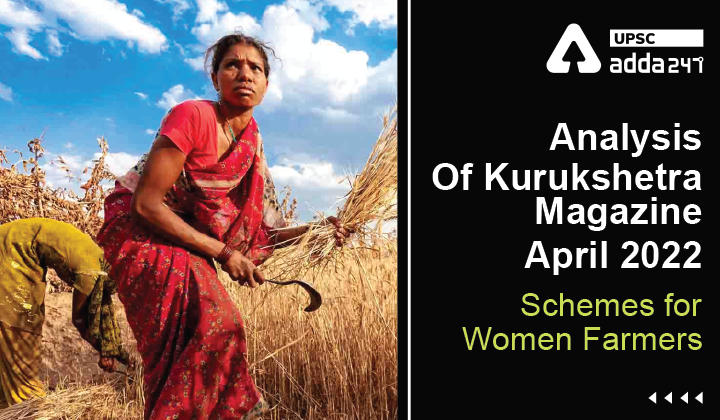Table of Contents
Analysis Of Kurukshetra Magazine
”Schemes for Women Farmers”
Relevance
”GS 2: Government Policies & Interventions”
”GS 3: Welfare Schemes, Issues Related to Women”
Context
- The Central Government has been pushing the agenda of ‘Gender Mainstreaming in Agriculture’ by way of earmarking funds for women under various schemes/programmes and development interventions.
- The agricultural sector employs 80% of all economically active women; they comprise 33% of the agricultural labour force and 48% of self-employed farmers.
What GOI is doing for Gender Mainstreaming in Agriculture?
- It guided States and other implementing agencies to incur at least 30% expenditure on women farmers.
- These schemes include Support to State Extension Programmes for Extension Reforms, National Food Security Mission, National Mission on Oilseed & Oil Palm, National Mission on Sustainable Agriculture, Sub-Mission for Seed and Planting Material, Sub-Mission on Agricultural Mechanization and Mission for Integrated Development of Horticulture.
Mahila Kisan Sashaktikaran Pariyojana (MKSP)
- ‘Mahila Kisan Sashaktikaran Pariyojana (MKSP)’, is a scheme as a sub-component of DAY-NRLM (Deendayal Antyodaya Yojana — National Rural Livelihoods Mission).
- This scheme is being implemented since 2011 with the objective to empower women by making systematic investments to enhance their participation and productivity, and also create sustainable livelihoods for rural women.
- The program is implemented in project mode through State Rural Livelihoods Mission (SRLM) as Project Implementing Agencies.
What is DAY-NRLM?
- Launched in the year 2011, the DAY-NRLM aims to reach out to 9-10 crore rural poor households by 2023-24.
- Under DAY-NRLM, women-owned Producers Enterprises are promoted to provide better market access to their farm produce through aggregation and value addition.
- These Producers Enterprises are formal entities registered under the Producers Company, Cooperative and Trust Act.
- The Producers Enterprises are being supported for setting for value addition infrastructure, commodity procurement, and capacity building of members.
Training Mechanism for Women Farmers
- In order to familiarize women with the latest techniques in agriculture and allied sectors, trainings are being imparted to women farmers under schemes of DA&FW and DAY-NRLM.
- These include Support to State Extension Programmes for Extension Reforms (ATMA) under Sub-Mission on Agriculture Extension (SMAE).
- Skill training courses in agriculture and allied areas (of a minimum 200 hours duration) are also being conducted for farmers including women farmers through National Training Institutes, State Agricultural Management & Extension Training (SAMETIs), Krishi Vigyan Kendras (KVKs) and State Agricultural Universities (SAUs), across the country.
- Under DAY-NRLM, the trainings on the agroecological practices are being provided through the community resource persons.
- KVKs established by the Indian Council of Agricultural Research (ICAR) impart training to farmers including women farmers on various aspects of agriculture and allied sectors.
Measures to Increase the Participation Of Women Farmers
- Provision of 30% of funds for women under various beneficiary oriented schemes/programmes.
- Taking pro-women initiatives such as supporting farm women’s food security groups, undertaking macro/micro-level studies in critical thrust areas related to women in agriculture, delivery of Gender Sensitization Module on Gender Learning through training programmes at the National/Region/State Level, compilation and documentation of gender-friendly tools/technologies.
- Farm Women Friendly Handbook and compilation of best practices/success stories of the women farmers, etc.
Conclusion
With women predominant at all levels of production- pre-harvest, post-harvest processing, packaging, marketing- of the agricultural value chain, to increase productivity in agriculture, it is imperative to adopt gender-specific interventions.



 TSPSC Group 1 Question Paper 2024, Downl...
TSPSC Group 1 Question Paper 2024, Downl...
 TSPSC Group 1 Answer key 2024 Out, Downl...
TSPSC Group 1 Answer key 2024 Out, Downl...
 UPSC Prelims 2024 Question Paper, Downlo...
UPSC Prelims 2024 Question Paper, Downlo...




